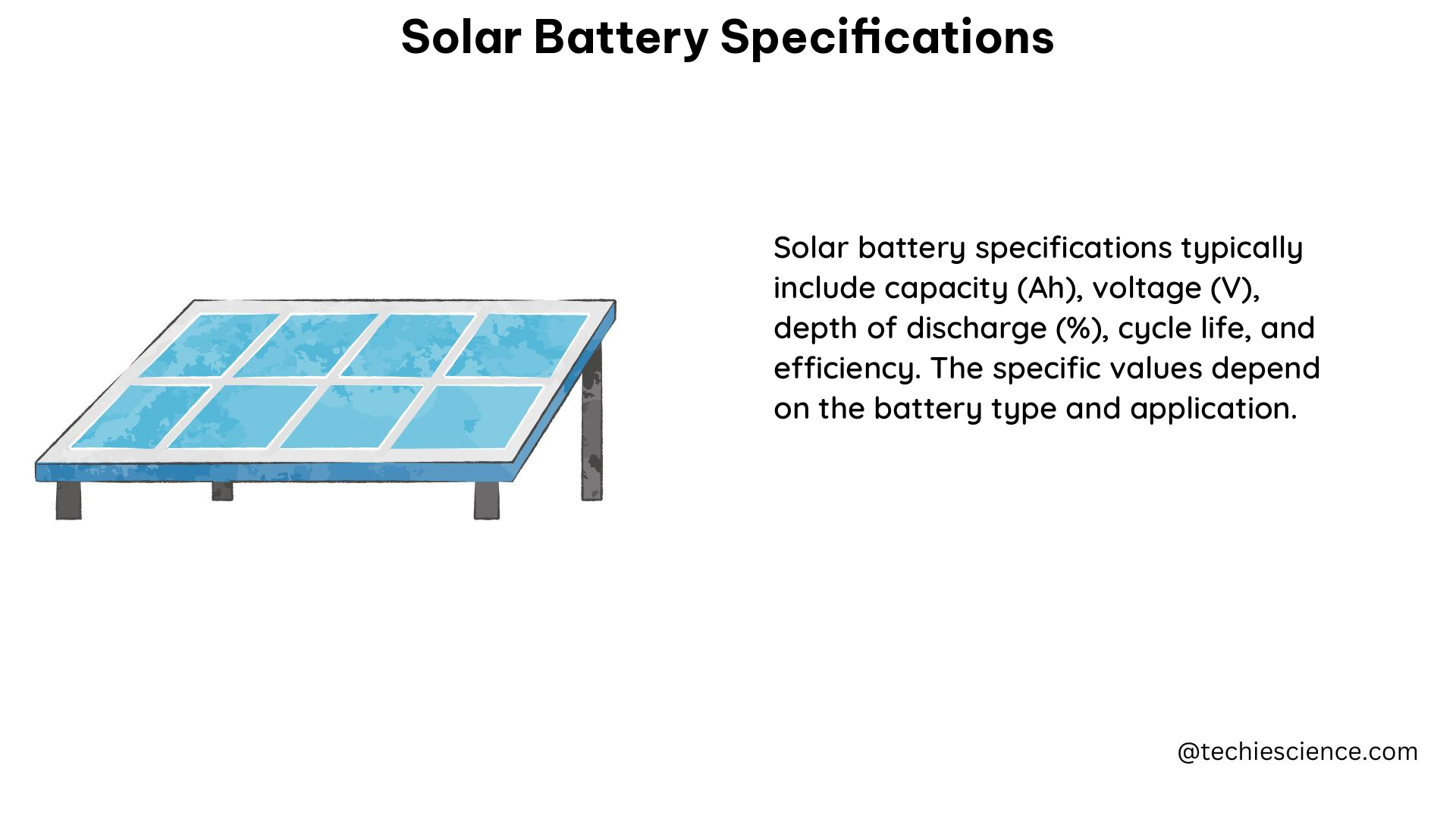Solar batteries are an essential component of off-grid and grid-tied solar energy systems, providing energy storage and backup power during outages or periods of low sunlight. Understanding the key specifications of solar batteries is crucial for homeowners and solar installers to ensure the right system is selected to meet their energy needs. This comprehensive guide delves into the details of solar battery capacity, size, lifespan, and cost, equipping you with the knowledge to make informed decisions.
Solar Battery Capacity: Powering Your Home’s Energy Needs
The capacity of a solar battery is measured in kilowatt-hours (kWh), representing the amount of energy it can store and discharge. This metric is crucial in determining the battery’s ability to meet your home’s energy demands.
- Residential Solar Battery Capacity Range: Typically, residential solar battery systems range from 1 kWh to several tens of kWh in capacity.
- Smaller Batteries (1-5 kWh): These are suitable for limited daily use and backup power, providing enough energy to power essential appliances during short outages.
- Medium Batteries (5-20 kWh): These batteries are designed for longer outages and higher energy demand, allowing homeowners to power their homes for extended periods without grid electricity.
- Larger Batteries (20+ kWh): For larger homes and businesses with higher energy consumption, these batteries offer increased storage capacity to meet the greater energy needs.
To determine the appropriate battery capacity for your home, consider your daily energy usage, the size of your solar panel system, and your specific backup power requirements. Consulting with a solar energy expert can help you make an informed decision.
Solar Battery Size: Matching Your Energy Needs

The size of a solar battery system is directly related to its capacity, and it’s essential to choose the right size to meet your energy requirements.
| Battery Size | Capacity Range | Typical Use Case |
|---|---|---|
| Small | 1 – 5 kWh | Limited daily use and backup power |
| Medium | 5 – 20 kWh | Longer outages and higher energy demand |
| Large | 20+ kWh | Larger homes and businesses with high energy consumption |
When selecting the size of your solar battery system, factors such as your household’s energy usage patterns, the size of your solar panel array, and your desired level of energy independence should be taken into account. Properly understanding your energy needs will help you choose the right-sized battery for your home or business.
Solar Battery Lifespan: Maximizing Your Investment
The lifespan of a solar battery is a crucial consideration, as it directly impacts the long-term viability and cost-effectiveness of your solar energy system.
- Typical Lifespan Range: Solar batteries typically have a lifespan ranging from 5 to 15 years.
- Lithium-Ion Batteries: These are the most popular choice for residential solar systems, with an average lifespan of 10 to 15 years.
- Factors Affecting Lifespan: Depth of discharge, usage patterns, temperature, maintenance, and manufacturer quality all play a significant role in determining the battery’s longevity.
To maximize the lifespan of your solar battery, it’s essential to follow the manufacturer’s recommendations for usage, maintenance, and storage. Proper care and management can help extend the battery’s useful life, ensuring a better return on your investment.
Solar Battery Cost: Balancing Performance and Budget
The cost of solar batteries can vary widely, depending on the technology, capacity, and brand.
- Lithium-Ion Battery Systems: Residential lithium-ion battery systems typically range from $5,000 to $15,000 or more, depending on the capacity and brand.
- Lead-Acid Battery Systems: Residential lead-acid battery systems cost around $1,000 to $5,000, but they may require earlier replacement due to shorter lifespans and higher maintenance requirements.
When budgeting for a solar battery system, consider not only the upfront cost but also the long-term operating and replacement costs. Factors such as the battery’s efficiency, warranty, and maintenance requirements can impact the overall cost of ownership. Consulting with a solar energy professional can help you find the right balance between performance and budget.
Conclusion
Solar batteries are a crucial component of modern solar energy systems, providing reliable energy storage and backup power. By understanding the key specifications of solar batteries, including capacity, size, lifespan, and cost, you can make informed decisions to ensure your solar energy system meets your energy needs and provides a long-lasting, cost-effective solution.
Remember, the right solar battery system for your home or business will depend on your unique energy requirements, budget, and long-term goals. Consulting with a solar energy expert can help you navigate the complexities of solar battery selection and ensure you make the best investment for your renewable energy needs.
References:
– Sizing Solar Power for Off-Grid Field Studies, Part I
– The Solar Panel Battery is Your Sales Team’s Best Friend
– Choosing the Right Size and Capacity for a Solar Battery System
– Understanding Solar Battery Capacity and Sizing
– Lithium-Ion vs. Lead-Acid Batteries for Solar Energy Storage

The lambdageeks.com Core SME Team is a group of experienced subject matter experts from diverse scientific and technical fields including Physics, Chemistry, Technology,Electronics & Electrical Engineering, Automotive, Mechanical Engineering. Our team collaborates to create high-quality, well-researched articles on a wide range of science and technology topics for the lambdageeks.com website.
All Our Senior SME are having more than 7 Years of experience in the respective fields . They are either Working Industry Professionals or assocaited With different Universities. Refer Our Authors Page to get to know About our Core SMEs.